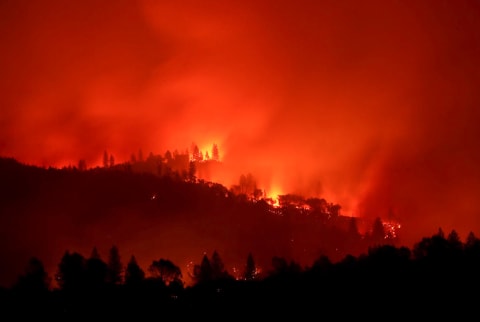Advertisement
Reflections On Climate Change, From Someone Who Lost Her Home In A Forest Fire


As I arrived home late on October 23, I had no idea that it would never look the same again. I received a text that a fire had started near my family's ranch and was quickly moving in our direction. With no time to grab any personal belongings, I drove to my mother's house to wake her up, and we evacuated.
I watched in my car from a distance as Kincade Fire roared to life, taking my home with it. The Kincade Fire destroyed over 75,000 acres.
I am very thankful that my family and I are safe, and I know that not everyone in California can say the same. Further south, the legendary Santa Ana winds fueled two other massive flares, the Getty and Easy Fires, both in densely populated areas. In at least two of these cases, power lines along arid terrain were involved in igniting the fires, aided by a growing trend in California's weather: hurricane-force winds paired with low humidity and precipitation.
The loss of my home is both tragic and ironic. Fire, the 2017 Pocket and Tubbs fires specifically, was what inspired me to start an organization that accelerates the climate solutions. And now, I am motivated more than ever.
The climate crisis is not relegated to the borders of California.
In 2018, the Intergovernmental Panel for Climate Change, a global scientific powerhouse commissioned by the United Nations, shared a report urging humanity to halve global emissions by 2030 in order to avoid catastrophic climate fallout. The report gave us a choice; we can continue to be reactive and adapt in small and insufficient ways, or we can be sweepingly proactive and turn a dire situation into an opportunity for innovation, global stability, and growth.
There isn't time to waste: Many other disasters like these are happening around the world every day. The rapidly changing climate is ravaging the ecosystems in the Amazon; it's melting Arctic ice at an unprecedented rate; it's warming and eliminating our ocean biodiversity. Yet we still proceed with business as usual, ignoring the signals out of convenience, paralyzing fear, and apathy. How long do we have to wait before we take action and mobilize across all sectors of society? If the answer is "years," it will be too late.
Here are some powerful changes we can advocate for right now.
1. Leave fossil fuels in the ground.
We are fooling ourselves if we think we're going to solve this crisis while still burning fossil fuels. This single collective decision would drive the development of, and clear the way for, climate solutions to take root. Divestment from fossil fuels will take a dedicated effort from many stakeholders—world leaders, automotive companies, and big industries, to name a few—but there are ways that we can start advocating for change now by supporting carbon-neutral organizations. Do you know if your 401(k) or your bank is fully divested from fossil fuels? You can find out here. Your dollars and your voice matter, and you can use them to accelerate real change.
2. Scale regenerative agriculture, which nourishes the land that nourishes us.
Practicing regenerative agriculture is one of the most significant ways that we can engage to reverse the climate crisis. Regenerative practices have the potential to draw down roughly one trillion tons of carbon—more than all humanity has emitted—from the atmosphere. In addition, these practices would increase the quality of our food and sustain the viability of earth's precious fertile land.
3. Think bigger and innovate faster.
We need to look past our most immediate needs and accept that this is a global crisis. That is the only way that we will solve this problem. Currently, we are living in a moment of pseudo-optimism, as though there is one yet-to-be identified technological solution that will suddenly reverse the impacts of the climate crisis. There is no silver bullet, but we do have real and tangible solutions already at our disposal. We have to demand action from our world leaders to take these solutions seriously and implement them before it's too late. We must work together across industries and specialties to demand action from those in power to make the climate emergency our global priority.
I just lost my home; I don't want us to lose ours.

What Is Coconut Sugar? Here's The Deal On This Cane Sugar Alternative
Michelle Konstantinovsky

What Is Coconut Sugar? Here's The Deal On This Cane Sugar Alternative
Michelle Konstantinovsky

What Is Coconut Sugar? Here's The Deal On This Cane Sugar Alternative
Michelle Konstantinovsky

What Is Coconut Sugar? Here's The Deal On This Cane Sugar Alternative
Michelle Konstantinovsky









